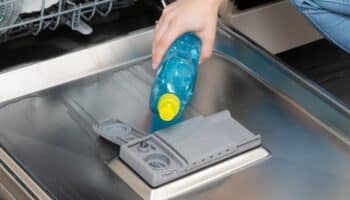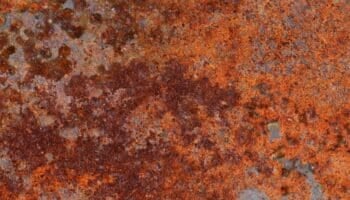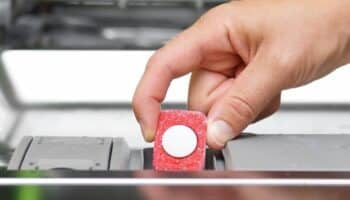We've independently reviewed this article to make sure it's as accurate as we can make it.
To find out more about our article creation and review process, check out our editorial guidelines.
Are you having a hard time deciding between a hard food disposer vs filtration?
You’re in good company! Dishwashers have simplified our lives since they were invented, as they remove the need to clean our dishes ourselves.
Both hard food disposers and filters do a great job at catching any crumbs and other food residues that might cause problems within the appliance, but which one is actually better at it?
Below, you’ll find a detailed article explaining their main differences based on key aspects, such as how they work, how they clean, and how loud they are.
Keep reading to get the most out of your dishwasher!
Why trust us? This article was written by Craig Anderson, James Blackford and Andy Fulenchek.
Craig has helped thousands of other homeowners repair their appliances since 2016.
James is one of our resident appliance experts, with over 16 years of experience. He currently works as a Master Technician for SquareTrade, and runs his own appliance repair business
Andy is one of our resident appliance repair experts with over a decade of experience. Andy currently runs his appliance repair company with a team of trusted technicians.
How Dishwasher Filters and Hard Food Disposers Work
Struggling to decide between a hard food disposer or filtration is completely normal, as they both seem very. I find that understanding how each one works before diving into their main Pros and Cons is one of the simplest ways to avoid confusion and clarify everything.
Hard Food Disposers
Essentially, hard food disposers work by using two small blades inside your dishwasher to process some of the food residues that fall off from your dishes during a wash cycle.
On paper, hard food disposers sound great, but the reality is that they’re not very strong. If you throw in excessive amounts of food or something that’s too hard in there, your dishwasher could clog, and the blades could break.
In case of clogging, the repair process is tedious, and in many instances, you have to tear down the dishwasher, so, in my experience, when considering a hard food disposer or filtration, in general, filtration is better.
Dishwasher Filters
Dishwasher filters do not shred food residue as hard food disposers do. These filters’ job is not to process crumbs but rather catch them.
During a wash cycle, all the food residue from your dishes goes down the drain line, and the filter catches them, keeping your dishwasher unclogged. Removing the filters at least once every 15 days and cleaning them thoroughly to prevent issues is recommended.
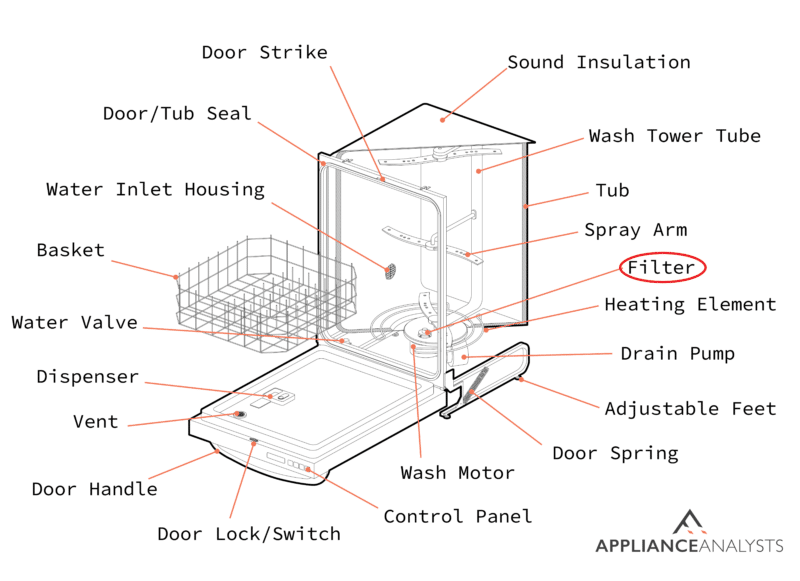
Comparing Hard Food Disposers vs Filters
As stated above, both hard food disposers and filters do a similar job inside your dishwasher, but if you’re here, you want detailed answers and clear differences. If you have little time to read right now, please check out the table below to get some useful data.
| Disposer | Filter | |
| Operation | Disintegrates food | Traps food |
| Cleaning | Doesn’t need cleaning | Must be manually cleaned every month |
| Noise level | Disposers create extra dishwasher noise. Quieter models on the market tend to be more expensive. | Quiet |
Remember that the table above doesn’t paint the full picture, so I recommend you keep reading to understand where each accessory shines and where it could improve.
Buying a new dishwasher is expensive. So, you’re undoubtedly keen to get the best you can for your money. Something hard-wearing, efficient, and quiet.
Shopping for a dishwasher is something we do only sometimes. Make sure you check out the rest of the dishwasher guide below, as it will keep diving deeper to help you decide between a hard food disposer or filtration.
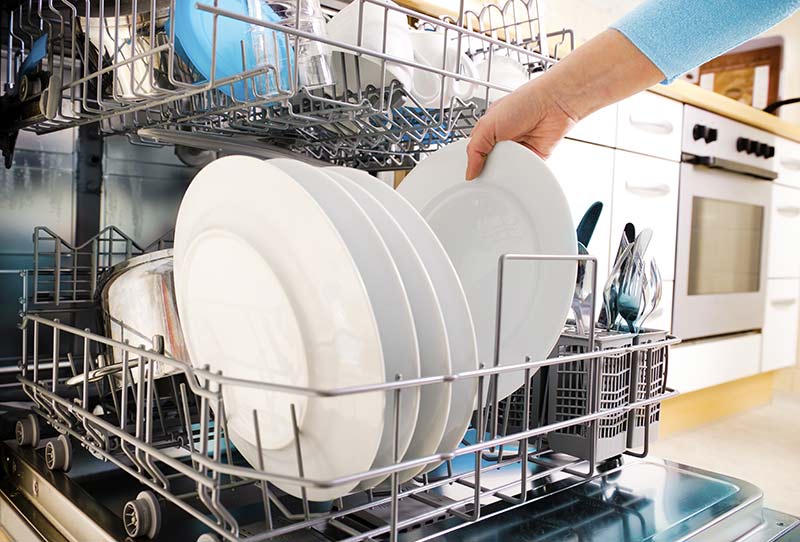
Hard Food Disposer or Filtration: The Dishwasher Dilemma [Guide]
Choosing a new dishwasher is a bit of a headache. There are so many things to consider, such as:
- Their cycles and programs
- Their maintenance
- Their noise levels
- Their energy-efficiency
Whether you want a dishwasher with a hard food disposer or filtration, the factors to consider are many! To keep things simple and render the decision-making process easier, I’ve divided this article into 3 main areas:
- Operation mode. How each solution gets rid of food.
- Cleaning method. The disposer or filter’s cleaning process.
- Noise level. How loud or how quiet the dishwasher is thanks to its disposer or filter.
Analyzing these categories will make it easier to set your expectations and help you choose the right dishwasher model.
Operation
So, you keep harping on at your family about their plates. You ask them to scrape them before they put them in the dishwasher. And they do, but only when you’re watching them, of course. When you’re not there, they sling their spaghetti bolognese dishes full of pasta in the machine, shut the door quickly behind them, and hope for the best.
Such habits may have you wondering, where does the soggy food that didn’t get scraped off the plates go? Well, the answer to that question differs depending on your dishwasher type. Here’s one of the main differences between a hard food disposer and a filter dishwasher:
| Disposer | Filter |
| -Disposers grind up food automatically -Disposers disintegrate food particles using a chopper | -Filters catch the food in a mesh plug underneath the bottom rack -Filters do not grind up the food pieces |
What can we conclude? Hard food disposers and filter dishwashers have very different operating methods. But both are efficient.
Is your choice of a dishwasher based on the operating method alone? Then you could choose either type to get the job done well.
Cleaning
Dishwashers have a fundamental purpose – washing the dishes so you don’t have to. A dishwasher should make your life easier. And let’s be honest, loading and unloading the dishwasher is hard enough work as it is. Is your dishwasher pushing you to do any extra maintenance? Then the appliance may be giving you more hassle than it’s worth.
There are differences between cleaning a hard food disposer and a filter dishwasher. Here are some of them:
| Disposer | Filter |
– You must empty the filter manually once a month. – If the filter is not cleaned regularly, it will begin to smell due to the food collection, reducing the water flow and preventing your dishes from cleaning properly. | – You must empty the filter manually once a month. – If the filter is not cleaned regularly, it will begin to smell due to the food collection, reducing the water flow and preventing your dishes from cleaning properly. |
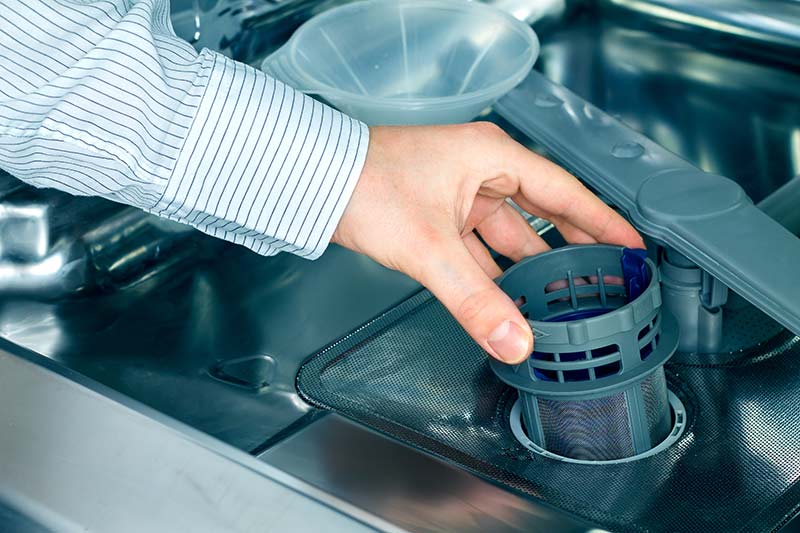
Maintaining a hard food disposer and a filter dishwasher is very different. Of course, cleaning a dishwasher filter is not a big deal, but it is another thing you’ll have to add to your list of things to do.
Is your choice of a dishwasher based on easy cleaning and minimal maintenance? Then your best option will be a dishwasher with a hard food disposer.
Noise
Now, if your home is anything like mine, it isn’t exactly quiet. You do not need rowdy kitchen appliances to raise the volume of your loud household. So, a dishwasher that works away in the background, making as little noise as possible, is essential.
There is a difference between the noise levels of a hard food disposer and a filter dishwasher. Here they are in a nutshell:
| Disposer | Filter |
| – Disposers add to the operating noise of the dishwasher, mainly because the chopper works to grind up SOFT food into tiny particles. Hard food disposers don’t work on things like cherry pits, bones, etc. – Many users find that the hard food disposer is noisy. | – Filters do not add to the operating noise of the dishwasher. |
Hard food disposers, although effective, may be an annoyance due to their loud operating noise. But manufacturers are actively working on ways to make the hard food disposers quieter. Here are some of the improvements they’ve made on the more expensive dishwasher models:
- Some hard food disposers now have a super-fine mesh and no noisy grinder. The water pressure forces the bits of food through the super-fine mesh, breaking the food down into tiny particles that leave the dishwasher through the drain line.
- Other dishwashers with a hard food disposer are manufactured with better insulation. The increased insulation reduces the level of noise that you can hear from the disposer.
These are good solutions for a disposer. But the disposer still may not work as quietly as a dishwasher filter.
Is your choice of a dishwasher based on noise alone? Then your best choice will be a dishwasher with a filter.
If you are considering a hard food disposer, make sure to check the customer reviews for the model you’re interested in. In our experience, some major and well-known brands are guilty of using super cheap materials to construct the blades and mesh.
Using poor-quality materials can cause many issues if food bypasses the dispenser and causes a jam at the pump.
Is a Hard Food Disposer Necessary in the Dishwasher?
Not really – no. Although a hard food disposer can sometimes make dealing with food residue a bit easier, in my experience, filtration can also do a great job in this regard. Dishwashers with a hard food disposer are a little more expensive, so I recommend you consider it.
Now, if you’re set on getting a dishwasher with a hard food disposer, here’s why buying one is still a good idea.
- If you didn’t scrape your plates, don’t worry. A hard food disposer works to pulverize food into tiny particles. Food residue is easily flushed out of the dishwasher, which saves you the trouble of scraping your plates before you put them in the dishwasher.
- No more dried-on food. There’s nothing worse than finding tableware still dirty after a cycle in the dishwasher. Dried-on food is common in cereal bowls, dinner plates, and the like.
Recapping
Now that you know almost all there is to know about both dishwasher complements, let’s summarize the overwhelming amount of information you were just given to clarify things. I find that the simplest way to compare things is with a Pros and Cons table.
Hard Food Disposers
| Pros | Cons |
| No need for cleaning | Noisy |
| Shred food residue | Expensive |
| Eliminate the need to scrape plates |
Filters
| Pros | Cons |
| Cheaper than Hard Food Disposers | They can become obstructed |
| Easy to replace | Need monthly cleaning |
| Add no extra noise | Plates must be scraped before placing them in the dishwasher |
| | |
Conclusion
That about sums it up!
Deciding between a dishwasher filter and a hard food residue is tricky, considering that, at first, they may fulfill the same purpose.
I hope this piece has helped make deciding between a hard food disposer or filtration easier and showcased where each one shines.
If this article was useful and interesting, why not check out some of our other resources and free guides? Who knows? You could join our email list!
Have a great day.
—Craig.
How Often Should I Clean the Filter on My Dishwasher?
As stated above, it’s recommended to clean your filter at least once per month. However, if you wash a lot of dishes and want to make sure there’s no excess food residue rotting on the filter for a month, cleaning it once a week is not a terrible idea.
Can the Filter Be Cleaned Inside the Dishwasher?
It depends on the make and model of your appliance. Some dishwashers do have the option to self-clean their filters to take this task off your hands.
Make sure to read your User Manual to see whether your unit offers this feature.
How Expensive Is It to Replace a Hard Food Disposer?
In the event that the hard food disposer in your dishwasher stops working, you can expect to pay anywhere between $50-200 or more if you own a high-end appliance.





